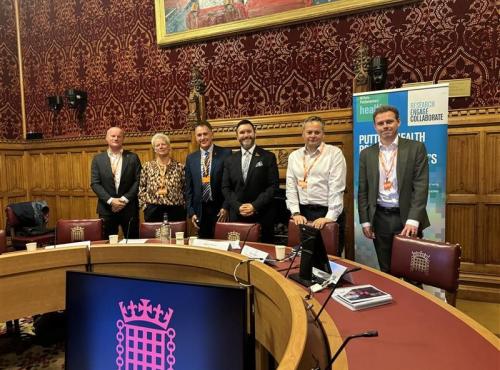How can Art and Design research and Arts research methodologies help tackle the biggest challenges faced by the UK?
APDIG's second roundtable today with the Council for Higher Education in Art & Design (CHEAD) was chaired by Policy Connect's Project Coordinator for Industry, Technology and Innovation - Shiza Naveed. We were also joined by speakers:
- Professor David McGravie - Vice-Chair of CHEAD
- Dr Rhiannon Jones - Post-Doctoral Researcher, Derby University
- Dr Catherine Baker - Associate Professor | Interdisciplinary Practice, Birmingham School of Art
- Dr Kirk Woolford - Principal Research Fellow in Creative Technologies, Anglia Ruskin University
The UK is currently faced with increasing challenges across health, climate, technology and more. The creative, design and innovation industries can add a lot of value to the solutions to these challenges but are not yet fully appreciated in policy. We have already been seeing emerging research across all these areas, especially at Design for Planet by the Design Council, just a month ago. What is now critical is for policymakers to acknowledge and utilise this research.
This session aimed to bring to light best practice and existing evidence by bringing together experts and examples from case studies together to discuss Art and Design Research and Arts Research methodologies and how they can be integrated beyond the Art and Design sector to help tackle the biggest challenges faced by the UK. This can include, but is not limited to, health, climate, technology and digital transformation, social issues, EDI, and more.
Questions for Discussion
- The A&D sector are well versed in the UK’s Grand Challenges, how can research and development be more directly translated into policy making and industry?
- What are examples of best practice? How is the sector working with other stakeholders to create solutions to these challenges? What are some of the barriers to this work?
- Are there any mechanisms be implemented that allow the full realisation and recognition of this research by policymakers?
Our first speaker, Professor David McGravie spoke on the collaboration between APDIG and CHEAD and the importance of this series of roundtables to bring forth a discussion on how to extend the support for Arts and Design and how to influence policy. He highlighted that the creative industries have the right problem solving skills needed to tackle the increasing number of challenges for the UK, including the health crisis, climate crisis, social issues and digital transformation. What is needed now is for parliament and government to support artists and the industry to properly develop these solutions.
Dr Rhiannon Jones, Derby University, introduced her research SHED which uses pop up innovation and arts hubs across the country to engage, inspire and cultivate ideas and dialogue and get people more engaged in arts while speaking on the need to inspire decision makers by creating a bridge between the camps.
Dr Catherine Baker, Birmingham School of Art introduced a interdisciplinary case study showing how creative methaphors can be applied to a health context in a study on adolescent scoliosis, bringing up an important discussion on imperfections, nature and self image.
Dr Kirk Woolford, Anglia Ruskin University, spoke on how much of what we see in today's society has been defined by artists, drawing on the example of science fiction influencing companies such as Meta, and how government needs to step up support and funding for individual artists to continue the chain of innovation.
Our third roundtable with CHEAD will take place in early 2022.
Please follow @IndTechInnov_PC on Twitter to stay up-to-date with the work of APDIG and to not miss out on any updates about our collaboration with CHEAD.



